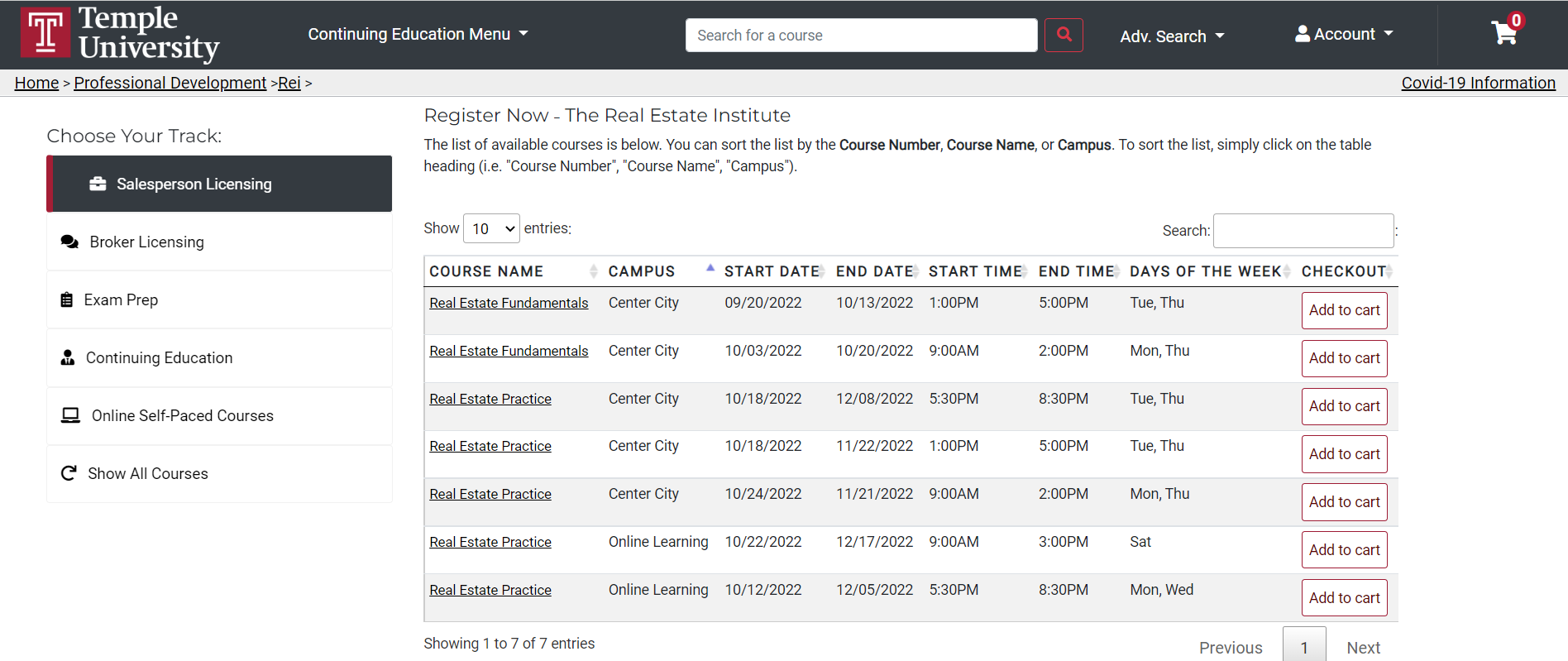
Many people are wondering if you need to go to college in order to become a licensed real estate agent. What degree should I get? Does a real estate license require a bachelor's degree? You can also earn a license without a college degree through a certificate program. Here are some ways to get started. Continue reading. Here are some key considerations.
Is it possible for a person to obtain a real license in the field of real estate without a college diploma?
The process of obtaining a real-estate license is straightforward. However, formal education is required in order to become a licensed agent. While most states require that you earn a bachelor's degree, some only require a high school diploma or GED. To become licensed in any of these states, you will need at least 18 years. According to the National Association of REALTORS (31% of realtors have a bachelor's degrees).

To become a licensed agent in real estate, you must pass a licensing exam. A majority of states require that you take a two part exam. This covers both state real-estate laws and general principles. After you have passed the exam you can submit your application at the state board. Once you have been approved by the state board, a certificate will be sent to your email and you will be added to the real estate agent list.
Does a bachelor's degree suffice for a license in real estate?
It depends on your location and goals whether a bachelor's degree or not is necessary to obtain a real estate license. An associate's level degree is a good way to get started. This program is typically two years long and provides a strong foundation to your future career. This program can also be advanced to a bachelor’s level to put yourself ahead of other applicants.
Three pre-licensing classes are required to obtain a California real estate license. These courses may be taken at an accredited college or real-estate school. Many schools also offer online courses. For the state exam, you will need to take an additional course to get a higher score. A bachelor's degree is required to become a real-estate agent.
You can get a real property license by completing a certificate program.
Online certificate programs can you obtain a real-estate license. Yes, you can. To get your real estate license, you must complete the pre-license education courses and pass the salesperson examination. A high school graduate and at least 18 must be your age. In order to renew your licence, you must also complete 18 hours continuing education every two year.

There are many routes to obtaining your license without having to attend college. There are reciprocity agreements between some states and other states. If you already have a real estate license in one state but want to practice in another, you can get the license in another state by completing the pre-licensing courses and passing the exams in the other state. Online learning is also possible to obtain your license.
FAQ
How do I calculate my rate of interest?
Market conditions impact the rates of interest. The average interest rate during the last week was 4.39%. Multiply the length of the loan by the interest rate to calculate the interest rate. For example, if $200,000 is borrowed over 20 years at 5%/year, the interest rate will be 0.05x20 1%. That's ten basis points.
How can you tell if your house is worth selling?
It could be that your home has been priced incorrectly if you ask for a low asking price. If you have an asking price well below market value, then there may not be enough interest in your home. Our free Home Value Report will provide you with information about current market conditions.
How do I eliminate termites and other pests?
Your home will eventually be destroyed by termites or other pests. They can cause damage to wooden structures such as furniture and decks. A professional pest control company should be hired to inspect your house regularly to prevent this.
Is it possible fast to sell your house?
If you plan to move out of your current residence within the next few months, it may be possible to sell your house quickly. Before you sell your house, however, there are a few things that you should remember. First, you must find a buyer and make a contract. Second, you need to prepare your house for sale. Third, you must advertise your property. You should also be open to accepting offers.
Statistics
- Based on your credit scores and other financial details, your lender offers you a 3.5% interest rate on loan. (investopedia.com)
- It's possible to get approved for an FHA loan with a credit score as low as 580 and a down payment of 3.5% or a credit score as low as 500 and a 10% down payment.5 Specialty mortgage loans are loans that don't fit into the conventional or FHA loan categories. (investopedia.com)
- Private mortgage insurance may be required for conventional loans when the borrower puts less than 20% down.4 FHA loans are mortgage loans issued by private lenders and backed by the federal government. (investopedia.com)
- 10 years ago, homeownership was nearly 70%. (fortunebuilders.com)
- When it came to buying a home in 2015, experts predicted that mortgage rates would surpass five percent, yet interest rates remained below four percent. (fortunebuilders.com)
External Links
How To
How to manage a rental property
Although renting your home is a great way of making extra money, there are many things you should consider before you make a decision. This article will help you decide whether you want to rent your house and provide tips for managing a rental property.
Here are the basics to help you start thinking about renting out a home.
-
What is the first thing I should do? Before you decide if your house should be rented out, you need to examine your finances. If you have debts, such as credit card bills or mortgage payments, you may not be able to afford to pay someone else to live in your home while you're away. It is also important to review your budget. If you don't have enough money for your monthly expenses (rental, utilities, and insurance), it may be worth looking into your options. This might be a waste of money.
-
What is the cost of renting my house? Many factors go into calculating the amount you could charge for letting your home. These include factors such as location, size, condition, and season. Keep in mind that prices will vary depending upon where you live. So don't expect to find the same price everywhere. Rightmove shows that the median market price for renting one-bedroom flats in London is approximately PS1,400 per months. This means that if you rent out your entire home, you'd earn around PS2,800 a year. That's not bad, but if you only wanted to let part of your home, you could probably earn significantly less.
-
Is it worth the risk? Doing something new always comes with risks, but if it brings in extra income, why wouldn't you try it? It is important to understand your rights and responsibilities before signing anything. It's not enough to be able to spend more time with your loved ones. You'll need to manage maintenance costs, repair and clean up the house. Make sure you've thought through these issues carefully before signing up!
-
What are the benefits? Now that you have an idea of the cost to rent your home, and are confident it is worth it, it is time to consider the benefits. Renting out your home can be used for many reasons. You could pay off your debts, save money for the future, take a vacation, or just enjoy a break from everyday life. It is more relaxing than working every hour of the day. If you plan well, renting could become a full-time occupation.
-
How can I find tenants After you have made the decision to rent your property out, you need to market it properly. Online listing sites such as Rightmove, Zoopla, and Zoopla are good options. Once you receive contact from potential tenants, it's time to set up an interview. This will enable you to evaluate their suitability and verify that they are financially stable enough for you to rent your home.
-
How can I make sure that I'm protected? If you fear that your home will be left empty, you need to ensure your home is protected against theft, damage, or fire. You'll need to insure your home, which you can do either through your landlord or directly with an insurer. Your landlord may require that you add them to your additional insured. This will cover any damage to your home while you are not there. However, this doesn't apply if you're living abroad or if your landlord isn't registered with UK insurers. In these cases, you'll need an international insurer to register.
-
It's easy to feel that you don't have the time or money to look for tenants. This is especially true if you work from home. You must put your best foot forward when advertising property. Make sure you have a professional looking website. Also, make sure to post your ads online. Also, you will need to complete an application form and provide references. While some prefer to do all the work themselves, others hire professionals who can handle most of it. You'll need to be ready to answer questions during interviews.
-
What happens once I find my tenant If you have a lease in place, you'll need to inform your tenant of changes, such as moving dates. If this is not possible, you may negotiate the length of your stay, deposit, as well as other details. Keep in mind that you will still be responsible for paying utilities and other costs once your tenancy ends.
-
How do I collect rent? When it comes time for you to collect your rent, check to see if the tenant has paid. If your tenant has not paid, you will need to remind them. Before you send them a final invoice, you can deduct any outstanding rent payments. You can always call the police to help you locate your tenant if you have difficulty getting in touch with them. They will not normally expel someone unless there has been a breach of contract. However, they can issue warrants if necessary.
-
How can I avoid problems? You can rent your home out for a good income, but you need to ensure that you are safe. Ensure you install smoke alarms and carbon monoxide detectors and consider installing security cameras. Also, make sure you check with your neighbors to see if they allow you to leave your home unlocked at night. You also need adequate insurance. You should never allow strangers into your home, no matter how they claim to be moving in.